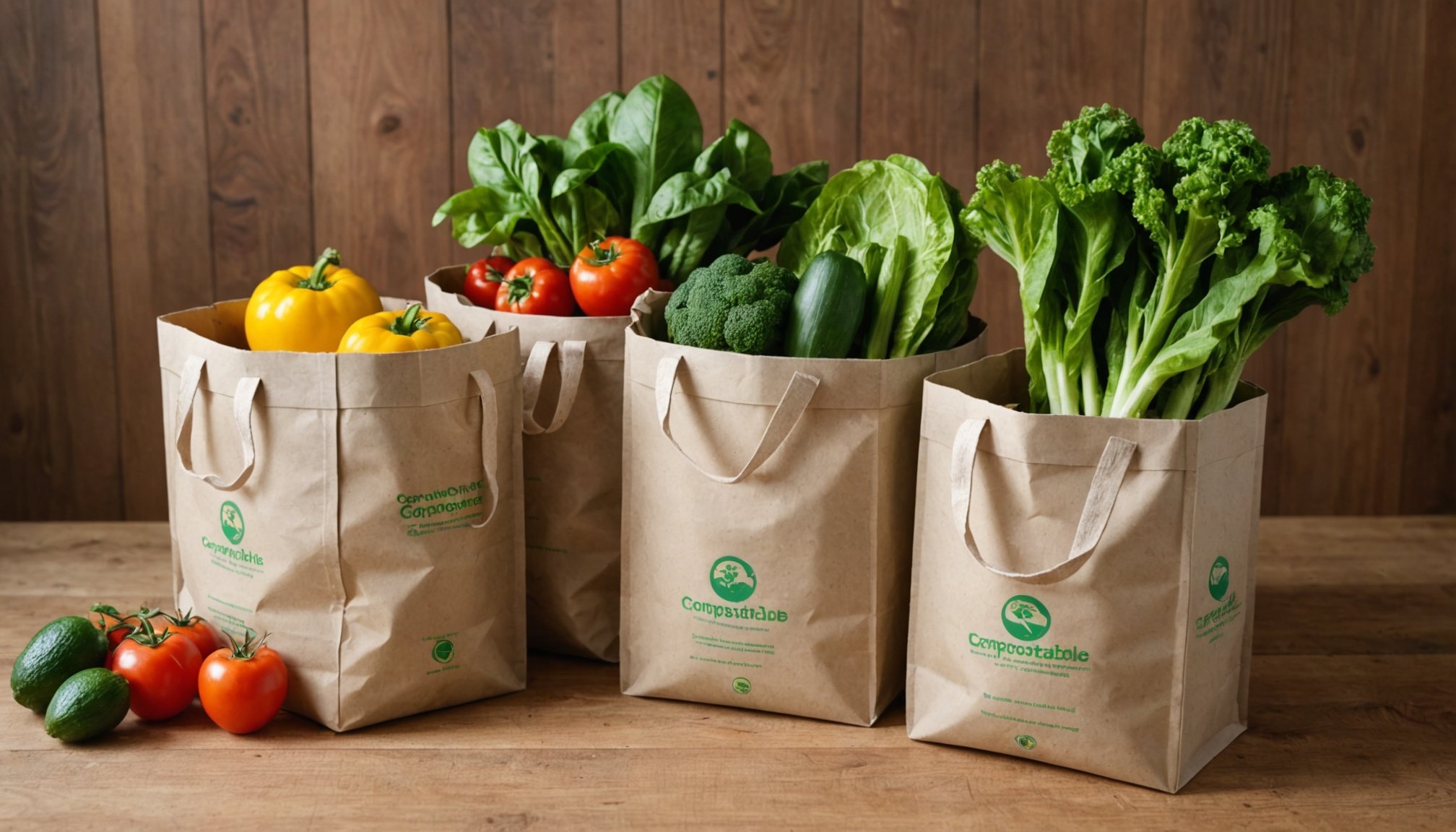Understanding Compostable Kitchen Bags
Compostable kitchen bags are designed with environmental sustainability in mind, providing an alternative to traditional plastic bags. Made from materials that break down in a composting environment, these eco-friendly bags help reduce landfill waste. A key benefit of these bags is their ability to decompose into non-toxic components, supporting healthier soil and contributing to a circular economy.
Key Differences from Biodegradable and Plastic Bags
Unlike ordinary plastic bags, compostable kitchen bags are subjected to stringent compostability standards, ensuring they break down under specific conditions. Biodegradable products may decompose over time, but not necessarily in an environmentally friendly manner and might leave microplastics behind. Understanding these distinctions is crucial for making informed purchasing decisions.
Have you seen this : Ultimate guide to installing an exceptional kitchen ventilation system for your uk home
Importance of Certification and Standards
While purchasing compostable products, it’s essential to look for certification that guarantees the product’s authenticity and environmental compliance. Certifications like EN13432 in Europe ensure the product meets necessary compostable standards. These standards confirm the product will decompose effectively without harmful residue, making them a reliable choice for eco-conscious consumers seeking to reduce their environmental footprint.
Reviews of Popular Compostable Kitchen Bags in the UK
In the UK market, several brands offer noteworthy compostable kitchen bags. Let’s delve into three popular choices based on user experiences and comprehensive analyses.
Topic to read : Ultimate guide to choosing the ideal refrigerator size for your expanding family in the uk
Brand A Review
Brand A stands out for its robust certifications, including EN13432, ensuring each bag meets stringent compostability criteria. Users appreciate the bags’ durability, often highlighting their reliability in kitchen settings. Some feedback points to a slight inconvenience in handling due to material stiffness, which varies under different temperature conditions. These bags are ideal for households looking for certified eco-friendly options with a focus on sustainability.
Brand B Review
Brand B impresses with its use of innovative plant-based materials, contributing positively to the environment. These bags receive high sustainability ratings, due in part to their effective decomposition process. However, consumers express mixed satisfaction regarding longevity when exposed to moisture. Despite this, recommendations lean towards ecological households prioritizing minimal environmental impact.
Brand C Review
Cost analysis for Brand C indicates a higher investment compared to traditional plastic bags. Their performance in composting scenarios showcases outstanding results, aligning closely with the needs of eco-conscious users. Critics suggest improvements in sealing mechanisms for optimal user experience. Nevertheless, Brand C provides significant advantages for those advocating for a greener waste disposal approach.
Criteria for Selecting Compostable Kitchen Bags
Choosing the right compostable kitchen bags means understanding the elements that affect their effectiveness and environmental impact. It’s vital to consider the right eco-friendly criteria when selecting kitchen bags for your specific needs.
Material Type
The material used in compostable kitchen bags is a fundamental factor. Often, these bags are made from either plant-based materials or petroleum-based substances. Plant-based options, such as cornstarch or PLA (polylactic acid), are preferable due to their sustainable sourcing and impact on biodegradability. Comparatively, petroleum-based alternatives might not decompose as effectively in composting conditions.
Size and Capacity
Selecting kitchen bags that fit your kitchen’s waste disposal needs is crucial. In the UK market, a range of sizes is available, catering to both household and commercial purposes. A bag’s capacity should reflect the volume of waste typically disposed of, ensuring efficiency and reducing unnecessary usage.
Certification and Standards
When navigating the purchase guide for eco-friendly criteria, verifying certifications is essential. Look for international marks, like EN13432, to confirm a product’s compostability. Authenticity checks can involve reviewing verified labels or consulting with sellers about their products’ compliance. These certifications reassure consumers, ensuring their waste disposal methods genuinely support environmental conservation.
Frequently Asked Questions
Compostable kitchen bags are increasingly popular in reducing waste sustainably. Consumers often wonder about how to properly dispose of these eco-friendly bags. The answer varies: some compostable bags are suitable for home composting. If they carry certifications like EN13432, they can typically be added to your compost pile. However, confirm your area allows these products in local compost facilities for the best results.
A common query is whether these bags can be used in municipal composting systems. This depends on the facility’s capabilities. While many accept certified biodegradable products, always check with local waste services to ensure compliance.
In selecting reliable brands, consider looking for those with strong certifications and eco-friendly criteria. Verified labels indicate compliance with compostability standards, ensuring the bags decompose efficiently without harming the environment. When buying advice is sought, prioritize brands with user reviews praising their durability and effective breakdown.
Ultimately, compostable kitchen bags FAQs help clarify use and disposal, empowering consumers to make informed decisions that support environmental sustainability. Whether indoor or outdoor composting, proper disposal practices are crucial for maximum benefit.
Sustainability Benefits of Using Compostable Bags
One significant advantage of using compostable kitchen bags is their contribution to reducing landfill waste. Unlike traditional plastic bags, which can take hundreds of years to break down, these eco-friendly bags decompose naturally, yielding valuable compost that enriches soil health. This process supports the circular economy by transitioning waste into productive resource, thus diminishing reliance on non-renewable materials.
Employing compostable bags also bolsters consumers in adopting eco-friendly waste disposal practices. By integrating these bags into daily routines, users gain a palpable understanding of sustainable living and its attendant benefits. Educating the public on the efficacy and positive impact of transitioning green could facilitate broader environmental awareness.
Furthermore, as these compostable advantages become more apparent, the demand for biodegradable products increases, encouraging innovation and wider accessibility. This response fosters a virtuous cycle, incentivising manufacturers to develop improved eco-friendly bags, tailored to consumer and environmental needs.
In promoting sustainability, ecosystem impacts extend beyond immediate waste reduction, with ripple effects on global waste management strategies. The holistic benefits not only meet personal and community aspirations but also support broader policy ambitions for environmental responsibility and climate action.
Where to Purchase Compostable Kitchen Bags in the UK
Purchasing compostable kitchen bags in the UK is made convenient through various avenues. Online platforms and local stores present numerous options for buying compostable bags that suit different preferences and budgets.
Online Retailers
Several major online retailers stock an extensive variety of eco-friendly bags, providing consumers the ease of shopping from home. Websites like Amazon and Ethical Superstore offer competitive pricing and diverse options, often with bulk purchasing capabilities. Shoppers are encouraged to compare prices and explore online purchasing options to secure the best deals tailored to their needs. While considering online purchases, it’s important to review customer feedback on both product performance and retailer service. Shipping considerations, like delivery fees and timelines, should also be weighed for a well-rounded choice.
Local Stores
Visiting local eco-friendly stores and supermarkets is a tangible way to buy compostable bags. These venues not only provide the opportunity to assess products physically but also support regional businesses. For those inclined towards in-person shopping, seeking out shops with a reputable selection of UK suppliers can be beneficial. Additionally, friendly staff can offer insights on certifications and eco-friendly criteria, guiding consumers towards products that align with both quality and sustainability expectations.











